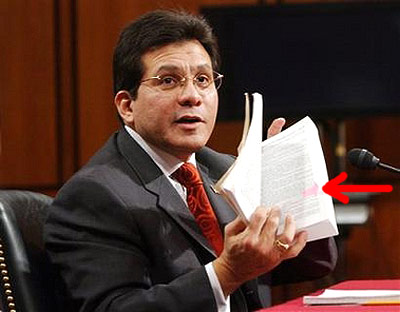Notes
Because (I Say) It Says So

During his testimony before the Senate Judiciary Committee yesterday, I found it fitting that bull-nosed Alberto Gonzales would present a marked-up book dealing with the Foreign Intelligence Surveillance Act.
One way of thinking about the Administration and Congress is in terms of an abusive relationship. The White House is the domineering and willful partner; Congress represents the subjugated and taken-for-granted, yet not thoroughly submissive other partner.
In these relationships, you often see a pattern where the dominant party — used to exploiting, and taking the other for granted — will occasionally end up doing something that goes farther than usual. When such an instance occurs, the sense of violation and offense in the weaker party can sometimes reach a degree that will override that person’s typical intimidation.
In the confrontation that follows, the weaker party will start by laying out the details of the charges (such as the fact the stronger one slept with the neighbor’s spouse, and then was caught walking out the apartment partially undressed).
What the weaker party will quickly find out, however, is that such details are irrelevant.
Imbued with righteousness, the stronger partner will argue that whatever the other person claims to think is beside the point. The issue, for the more powerful one, is never what happened. The question is how anybody could dare question the motives, intentions or judgement of a higher authority.
In holding up the book, and even pointing out particular passages (notice a section on the lower right-hand page faintly highlighted with red), Gonzales’ is not evoking principles of law. Instead, he is reminding Congress that, based on the ultimate vision and authority of the Executive branch, he has every right to pick and choose between statutes, and to emphasize or ignore phrases and clauses that might supersede those statutes.
In these asymmetrical confrontations, the debate is never about the issue itself. It’s about power, and about what basis exists for holding the conversation at all.
(image: Dennis Cook/A.P. February 6, 2006, Washington. Via YahooNews)


Reactions
Comments Powered by Disqus